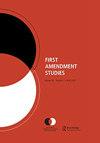“这就是我们”:新西兰奥特亚白人、种族主义和殖民主义中的言论自由
Q2 Social Sciences
引用次数: 3
摘要
白人作为一种意识形态是构成新西兰政治基础设施的默认规范。新西兰奥特亚罗阿的言论自由机制是用种族主义大师的工具建立起来的,它植根于白人,坚持言论自由的自由表达,同时对土著和少数族裔的现实进行非人化和诋毁。新西兰对立法承认毛利人部落国家没有将主权割让给外国土地持矛盾态度,这是一次史诗般的侵犯人权行为,是随后对毛利人和少数群体一连串侵犯人权行为的前兆。言论自由话语被用作一个不可逾越的盾牌,为对土著和少数群体的威胁、攻击和辱骂性攻击辩护——无论是心理上还是身体上。梅西大学追求一所由提里提大学领导的大学,取消了一位以毛利人为负面目标和刻板印象的知名演说家,导致全国对言论自由权被剥夺的愤怒。种族主义和非人性化言论对目标群体的影响再次从公共话语中消失。我们试图从言论自由的另一方面阐明土著和少数群体的边缘化现实。本文章由计算机程序翻译,如有差异,请以英文原文为准。
“This is us”: Free speech embedded in whiteness, racism and coloniality in Aotearoa, New Zealand
ABSTRACT Whiteness as an ideology is the default norm constituting the infrastructures of New Zealand’s polity. Built with the master’s tool of racism, the mechanics of free speech in Aotearoa, New Zealand is embedded in whiteness that holds fast to liberal expressions of free speech, while dehumanising and denigrating indigenous and minority coloured realities. New Zealand’s ambivalence towards legislative acknowledgement that Māori tribal nations did not cede sovereignty to a foreign land as confirmed in te- Tiriti o Waitangi, is an epic human rights violation that is the precursor to a litany of human rights violations upon Māori and minority groups that followed. Freedom of speech discourse has been utilised as an impenetrable shield to justify threatening, offensive and abusive attacks – both psychologically and physically upon indigenous and minority groups. Massey University’s pursuit of a te-Tiriti led university actioned the cancelling of a known public speaker that negatively targets and stereotypes Māori, leading to national outrage at the perceived denial of the right to freedom of speech. The effects of racist and dehumanising speech upon targeted groups was again missing from public discourse. We attempt to illuminate the marginalised realities of indigenous and minority groups on the flipside of free speech discourse.
求助全文
通过发布文献求助,成功后即可免费获取论文全文。
去求助
来源期刊

First Amendment Studies
Social Sciences-Law
自引率
0.00%
发文量
0
期刊介绍:
First Amendment Studies publishes original scholarship on all aspects of free speech and embraces the full range of critical, historical, empirical, and descriptive methodologies. First Amendment Studies welcomes scholarship addressing areas including but not limited to: • doctrinal analysis of international and national free speech law and legislation • rhetorical analysis of cases and judicial rhetoric • theoretical and cultural issues related to free speech • the role of free speech in a wide variety of contexts (e.g., organizations, popular culture, traditional and new media).
 求助内容:
求助内容: 应助结果提醒方式:
应助结果提醒方式:


